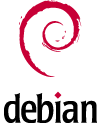Checking in on the "Let's Use Linux" experiment
In March I started looking at how much of my work I could do on Linux, using Debian on a dual-boot machine alongside Windows 10.
It’s gone fairly well, and something that speaks to that is that a little while ago I found that I couldn’t remember my Windows password. I really thought I had it on the fifth try, but that was just the loading screen taking a bit longer. I got it the sixth time.
Software development on Linux frequently matches or exceeds the experience on Windows, especially if you’re not tied to a Windows-based development environment. The UNIX terminal is excellent, and Microsoft developers have been working on supporting it within Windows 10. That project is still in its early phases, but it’ll be appreciated by many Windows-based developers who prefer the Linux/Mac OS terminals.
Several of the UNIX compilers are ahead of Windows, including for C and Ruby. The difference is significant for Ruby on Rails developers, and seems to be partly due to the majority of core Ruby and Rails contributors working from Mac OS or Linux environments.
Software development, web browsing and document processing can all be done equally well on any of Linux, Windows or Mac OS, although there are a number of environment-specific applications that have slightly different workflows. GIMP is certainly more powerful than Microsoft’s Paint, but it also obscures some basic operations like moving portions of images or drawing shapes.
I’ve continued to use Windows for some games and a few Windows-specific programs, but I log into my Windows environment much less frequently than I used to. Most of my workflow is independent of the operating system, so it turns out to be more a matter of personal preference rather than difference in capability or convenience. Some things take a bit more effort on Linux, such as getting your computer to work with newer hardware, but there are also more people interested in sharing solutions when they figure out how to solve a specific problem. The concept of producing and contributing to free and open source software resonates with me, and many aspects of the Linux community function around the sharing of information.
I started on Debian Stable and upgraded to Debian Testing, which receives more frequent updates and supports newer packages. It hasn’t caused me any problems so far, and the Debian development team seems to have a great focus on stability. Some developers like working on Debian Unstable, which is the slightly more “bleeding edge” branch where you can check out many of the newest features that are being introduced on a trial basis.
I haven’t had any issues with core system software not working, and have actually had fewer stability issues than on Windows, where every few days the start menu stops working, or Windows Explorer (the graphical file manager, not Internet Explorer) acts up and has to be restarted.
One aspect of Debian that may turn off new users is that there is less of a focus on ensuring that graphical interfaces are user-friendly and “just work”. Terminal-based solutions are often the most rigorously tested and used, so some familiarity and level of comfort using the terminal is helpful when using Debian. People coming from a purely graphical interface-based environment may have a more enjoyable experience on more graphically-focused Linux distributions like Ubuntu, Zorin OS, Linux Mint or LXLE.
I’ll continue to use Linux as my main operating system, and use Windows for what it does best. I haven’t gotten around to improving the battery usage, or getting Debian fully working with my printer (from the PDF document viewer, over WiFi, etc). The current battery lifetime is around a couple hours, with Windows lasting a couple more. I only rarely print documents, so I may work on that in the next week or so.
In conclusion, Debian seems to be a fine operating system for software developers, and may appeal to people who prioritize system stability and enjoy fiddling with their system. It does require a bit more set up than Windows or Mac OS, but requires very little maintenance and has proven to be very reliable for everyday use.
